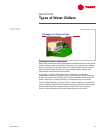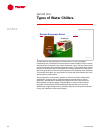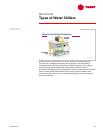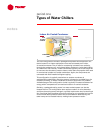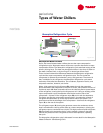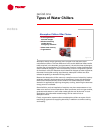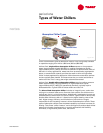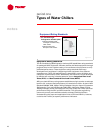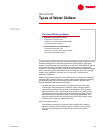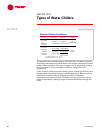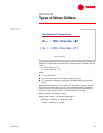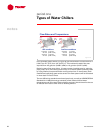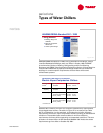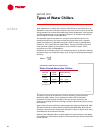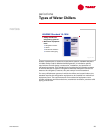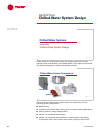
TRG-TRC016-EN 19
period one
Types of Water Chillers
notes
The IPLV predicts chiller efficiency at the ARI standard rating conditions, using
weighted-average load curves that represent a broad range of geographic
locations, building types, and operating-hour scenarios, both with and without
an airside economizer. The NPLV uses the same methods to predict chiller
efficiency at non-standard rating conditions. Although these weighted-average
load curves place greater emphasis on the part-load operation of an average,
single-chiller installation, they will not—by definition—represent any
particular installation.
Additionally, ARI notes that more than 80 percent of all chillers are installed in
multiple-chiller systems. Chillers in these systems exhibit different unloading
characteristics than the IPLV weighted formula indicates. Appendix D of
Standard 550/590–1998 explains this further:
The IPLV equations and procedure are intended to provide a single-
number, part-load performance number for water-chilling products.
The equation was derived to provide a representation of the average
part-load efficiency for a single chiller only. However, it is best to use a
comprehensive analysis that reflects the actual weather data, building
load characteristics, operational hours, economizer capabilities, and
energy drawn by auxiliaries, such as pumps and cooling towers, when
calculating the chiller and system efficiency.
Here is the important part:
This becomes increasingly important with multiple-chiller systems
because individual chillers operating within multiple-chiller systems
are more heavily loaded than single chillers within single-chiller
systems.
Part-Load Efficiency Rating
▲ Integrated Part-Load Value (IPLV)
◆ Weighted-average load curves
◆ Based on an “average” single-chiller installation
◆ Standard operating conditions
▲ Non-Standard Part-Load Value (NPLV)
◆ Weighted-average load curves
◆ Based on an “average” single-chiller installation
◆ Non-standard operating conditions
Figure 22



